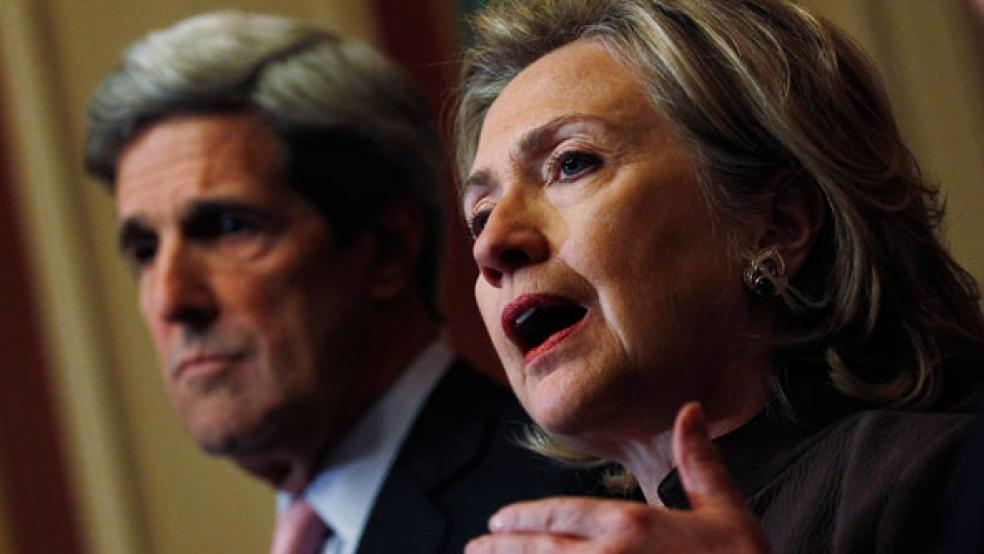On Tuesday morning, former Secretary of State Hillary Clinton continued her celebratory Washington homecoming by having breakfast with Vice President Joe Biden, a one-time rival who  might be her rival again in the 2016 presidential election.
might be her rival again in the 2016 presidential election.
The previous day, Clinton had lunch with President Obama, another one-time rival who defeated her in the 2008 Democratic primary but rewarded her with an appointment as Secretary of State. The relationship between Obama and Clinton was once cold. But over time they set their differences aside and Clinton left State with glowing reviews.
Clinton’s tour of Washington serves as a reminder that she remains one of the shining stars of the Democratic Party. She’s wildly popular with Democratic voters and is still the front-runner for the 2016 Democratic Presidential nomination.
But the timing of the visit also served as a reminder of one of Clinton’s disappointments: her time as Secretary of State. As Clinton was dining with Obama and Biden, her successor John Kerry was kicking off peace talks between Israel and the Palestinians. Talks between the two sides have been dormant for years. Reviving them is a major diplomatic win for Kerry.
Where Kerry has succeeded, Clinton has failed. Relations between Israeli Prime Minister Benjamin Netanyahu and Clinton’s State Department were stressed from the start. In 2010, they were at odds over the construction of 1,300 Israeli housing units in the Arab part of Jerusalem. She said Netanyahu's decision was "counterproductive to our efforts to resume negotiations between the parties,” a statement that led to the accusation that the Obama White House had turned its back on Israel.
Of course, Obama set the tone of the relationship with Israel. But the revival of the peace talks under Kerry does serve as a reminder that Clinton was far from the most effective Secretary of State.
Setting aside the politicized Benghazi attack, critics say that Clinton failed to advance U.S. interest in a number of areas, including the Middle East. And many times, she found herself on the wrong side of history, advocating policies that time would show to be faulty.
“There’s been a lot of attention on the conservative attacks against her and she’s been on the receiving end of unjustified criticism. Many Democrats are offended by these conservative attacks,” Stephen Zunes, a professor of politics at the University of San Francisco, told The Fiscal Times Tuesday. “There’s been a tendency to overlook her more hawkish views that have alienated some of our closest allies.”
A MARGINALIZED DIPLOMAT
When Clinton was appointed, the Obama administration was retracting from world events as opposed to actively engaging them. This soft power approach gave Clinton little chance to make grand gestures on behalf of the United States. Often times, her trips abroad felt more like celebrations of her as a politician as opposed to a stateswoman.
At the same time, Clinton was a victim of uncontrollable circumstances. Her appointment was largely seen as an olive branch from Obama to Clinton after a brutal campaign. But this sign of peace did not come with an invitation to Obama’s inner circle, where his national security team took the lead in shaping foreign policy.
According to Vali Nasr, a former adviser to Clinton and the late Richard Holbrooke, Obama's national security team believed that the military and the CIA should be the primacy instruments of diplomacy. This made the State Department superfluous in the execution of foreign policy.
“These agencies’ solutions were not, and could never be, a substitute for the type of patient, long-range, credible diplomacy that garners the respect of our allies and their support when we need it,” Nasr wrote in his book, The Dispensable Nation: American Foreign Policy in Retreat.
A SPOTTY RECORD
Yet on the occasions when Clinton has been able to shape foreign policy, she’s been on the wrong side of history. Her hawkish support for the Iraq war cost her the presidency.
Support for questionable policies continued at State. She advocated for an aggressive response to the uprisings that came to form the Arab Spring while backing the stability provided by former President Honsi Mubarak. The entire U.S. response to the revolutions was muddled and often incoherent.
At the same time, her much touted reset with Russia has largely failed: The Snowden debacle has shown Russia to be an unreliable partner. She also touted Syrian President Bashar al-Assad as a reformer. He's now waging a war against his own person that has claimed more than 100,000 lives. And as John Kerry is proving now, she miscalculated the chances for an Israeli-Palestinian peace process.
CHAMPION FOR WOMEN
Even with a thin resume, Clinton remains a popular figure: an April 2013 Gallup poll found that 63 percent of Americans have a favorable opinion of Clinton.
According to Suzanne Petroni, senior director of gender, population and development at the International Center for Research on Women, Clinton’s greatest accomplishment was her elevation of women’s’ rights into foreign policy.
“She has been an undisputed leader in making gender quality and women’s empowerment a matter of US foreign policy in a way that was unprecedented;” Petroni told The Fiscal Times. “From early on, she consistently raised the question about women and girls in every foreign policy area where others may not have thought the issues were relevant.”





